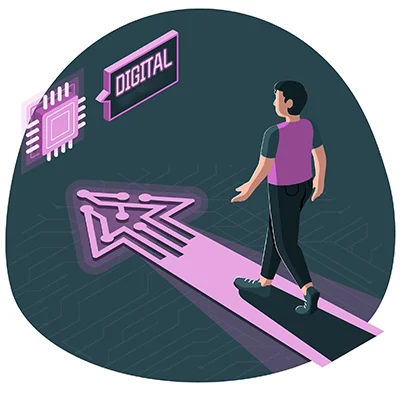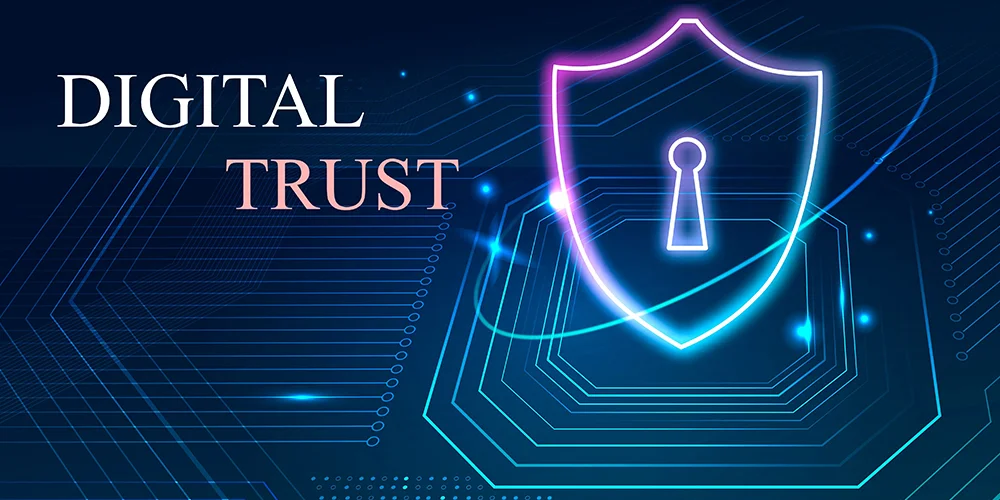Digital Trust: Strategies for Protecting Data and Privacy refers to the level of confidence and reliability that individuals, organizations, or systems have in the security, integrity, and authenticity of digital interactions, transactions, and data in the digital world.
Types of Digital Trust
Digital trust can be categorized into various types, each focusing on specific aspects of trust in the digital realm.
Here are some common types of digital trust:
- Security Trust: This type of trust relates to the confidence in the security measures implemented to protect digital assets and data. It includes aspects such as encryption, firewalls, authentication methods, and cybersecurity practices.
- Privacy Trust: Privacy trust is about the assurance that an individual’s personal information and data will be handled in a manner that respects their privacy rights. It involves compliance with data protection regulations, transparent data handling practices, and obtaining informed consent from users.
- E-commerce Trust: E-commerce trust focuses on the confidence that consumers have when making online purchases. It encompasses factors like secure payment processing, reliable product delivery, trustworthy product descriptions, and responsive customer support.
- Identity Trust: Identity trust is about verifying the authenticity of digital identities, such as user accounts, digital certificates, and online profiles. It involves methods like multi-factor authentication (MFA) and digital identity verification services.
- Brand Trust: Brand trust is related to the reputation and credibility of organizations or brands in the digital space. Positive online reviews, customer testimonials, and a history of delivering quality products or services contribute to brand trust.
- Data Trust: Data trust involves the confidence that data is accurate, reliable, and has not been tampered with. Blockchain technology, for example, is used to establish data trust through its immutable ledger.
- Platform Trust: Platform trust is associated with the reliability and safety of digital platforms, such as social media networks, online marketplaces, and cloud services. Users need to trust that these platforms will protect their data and provide a stable environment.
- Cloud Trust: This type of trust pertains to the confidence in cloud computing services’ security, availability, and data integrity. Cloud service providers must demonstrate their ability to protect customer data and maintain uptime.
- Government Trust: Government trust relates to the confidence in government agencies’ ability to secure citizens’ digital records, protect national security, and enforce digital regulations. It often involves legal frameworks and compliance.
- Peer Trust: Peer trust is about trusting other users in online communities, social networks, or collaborative platforms. It’s crucial for the sharing of information, collaboration, and forming online relationships.
- Device Trust: Device trust is the confidence that the devices used in digital interactions are secure and free from malware or vulnerabilities. This is especially important in the context of the Internet of Things (IoT) and smart devices.
- Algorithmic Trust: Algorithmic trust relates to the confidence in the fairness, transparency, and accuracy of algorithms used in various digital applications, such as recommendation systems, credit scoring, and decision-making processes.
- Community Trust: Community trust involves trust within online communities, forums, and social networks. It includes trusting the moderation of content, the credibility of community members, and the reliability of information shared.
These types of digital trust are interconnected and often overlap. Building and maintaining trust in the digital world requires a holistic approach that addresses multiple dimensions of trust to create a secure and reliable digital ecosystem.

Features of Digital Trust
Digital trust encompasses various features and characteristics that are essential for establishing confidence and reliability in digital interactions, transactions, and data.
Here are some key features of digital trust:
- Security: Trust in digital systems relies on robust security measures to protect against unauthorized access, data breaches, and cyberattacks. Features like encryption, secure authentication, and intrusion detection contribute to security-based trust.
- Privacy Protection: Ensuring the privacy of personal information is a crucial feature of digital trust. Organizations must implement privacy policies, data anonymization, and consent mechanisms to protect user data.
- Authentication and Identity Verification: Reliable authentication methods and identity verification processes are essential for confirming the authenticity of digital entities, such as users and devices.
- Transparency: Transparent practices, such as disclosing data handling policies, algorithms, and decision-making processes, foster trust by providing users with visibility into how their data is used and digital decisions are made.
- Data Integrity: Trust relies on data integrity, which ensures that data remains accurate, complete, and unaltered during digital transactions and storage.
- Compliance with Regulations: Trustworthy digital entities and organizations adhere to relevant legal and regulatory frameworks, such as data protection laws, to ensure compliance and demonstrate a commitment to responsible digital practices.
- Reliability: Reliability is a key feature of digital trust, as users expect digital systems to be available and functional when needed. Reliability is achieved through redundancy, disaster recovery plans, and high availability.
- Accountability: Being accountable for actions and decisions in the digital realm is vital for trust. Organizations and individuals must take responsibility for any errors, breaches, or data mishandling.
- User-Centric Design: Trust is enhanced when digital interfaces and experiences are designed with the user in mind, ensuring ease of use, accessibility, and a positive user experience.
- Feedback and Reputation Systems: Features like feedback mechanisms, online reviews, and rating systems help users make informed decisions and build trust in digital platforms and services.
- Cybersecurity Measures: Demonstrating a commitment to cybersecurity, including proactive measures to identify and address vulnerabilities, is a critical feature of digital trust.
- Continuous Monitoring and Improvement: Trust is an ongoing process that requires continuous monitoring of digital systems and processes to identify and mitigate risks. Organizations should be dedicated to improving security and privacy measures.
- Interoperability: Digital trust is bolstered when digital systems and technologies can seamlessly work together, ensuring compatibility and data sharing without compromising security.
- Data Portability: Users should have the ability to move their data easily between digital platforms and services, contributing to trust by giving users control over their data.
- Education and Awareness: Promoting digital literacy and awareness of potential risks and best practices for online behavior is important for building trust among users.
- Ethical Practices: Upholding ethical standards in digital interactions, including fairness, honesty, and respect for user rights, is a fundamental feature of digital trust.
- Incident Response: A well-defined incident response plan, which outlines how an organization will handle data breaches or security incidents, instills confidence that issues will be addressed promptly.
These features collectively contribute to the establishment and maintenance of digital trust in an increasingly interconnected and data-driven world. Organizations and individuals alike must prioritize these features to foster a secure and trustworthy digital environment.
Benefits of Digital Trust
Digital trust offers numerous benefits to individuals, organizations, and society as a whole. These benefits encompass various aspects of security, privacy, reliability, and confidence in digital interactions.
Here are some of the key advantages of digital trust:
- Enhanced Security: Digital trust fosters confidence in the security of digital systems and data. This leads to reduced risks of cyberattacks, data breaches, and unauthorized access, ultimately protecting sensitive information and assets.
- Privacy Protection: Users are more likely to engage in online activities and share personal information when they trust that their privacy will be respected. This can lead to increased participation in digital services and e-commerce.
- Increased Adoption of Digital Technologies: High levels of digital trust encourage people to adopt and embrace digital technologies, such as online banking, e-commerce, and IoT devices, which can lead to increased convenience and efficiency.
- Economic Growth: Trust in digital interactions can stimulate economic growth by promoting e-commerce, digital entrepreneurship, and the development of new digital services and products.
- Data Sharing and Collaboration: Digital trust encourages data sharing and collaboration among organizations and individuals, leading to more effective research, innovation, and business partnerships.
- User Confidence: Users who trust digital platforms and services are more likely to engage with them, leading to increased user engagement, customer loyalty, and repeat business.
- Reduced Fraud and Scams: A higher level of digital trust can lead to a decrease in online fraud, scams, and phishing attacks, as users become more discerning and cautious in their digital interactions.
- Efficient Decision-Making: Trust in algorithms and data-driven decision-making processes can lead to more efficient and effective decision-making in various domains, from finance to healthcare.
- Improved Customer Relationships: Organizations that prioritize digital trust can build stronger, long-lasting customer relationships based on trust and reliability.
- Global Connectivity: Digital trust enables individuals and organizations to connect and collaborate globally with confidence, facilitating international trade and cooperation.
- Resilience: Trustworthy digital systems and infrastructures are more resilient to cyber threats, ensuring that critical services and operations remain operational even during security incidents.
- Compliance and Risk Mitigation: Organizations that prioritize digital trust are more likely to comply with data protection and cybersecurity regulations, reducing legal and reputational risks.
- Innovation: Trust in digital technologies encourages investment in research and development, leading to the creation of innovative solutions and advancements in technology.
- Social Benefits: Digital trust can lead to social benefits, such as improved access to education, healthcare, and government services, especially in remote or underserved areas.
- Environmental Impact: Trust in digital systems can promote environmentally friendly practices by enabling remote work, reducing the need for physical resources, and optimizing energy consumption.
- Data-driven Insights: Organizations can derive valuable insights from trusted data, leading to better decision-making, product development, and customer experiences.
Overall, digital trust is a fundamental enabler of the digital economy and modern society, driving innovation, economic growth, and positive societal outcomes while safeguarding security, privacy, and individual rights.

How Does it Work
Digital trust is built and maintained through a combination of technological, organizational, and societal factors. It involves creating an environment in which individuals and organizations can have confidence in the security, privacy, reliability, and authenticity of digital interactions and transactions.
Here’s how it works:
- Technology and Security Measures:
– Encryption: Encryption techniques, such as SSL/TLS for web communications, protect data in transit, ensuring that it cannot be intercepted and read by unauthorized parties.
– Access Controls: Strong authentication mechanisms, like usernames and passwords, biometrics, and multi-factor authentication (MFA), ensure that only authorized users can access digital systems and data.
– Firewalls and Intrusion Detection Systems: Firewalls filter network traffic, and intrusion detection systems monitor for suspicious activities, helping to protect against cyberattacks.
– Data Protection: Measures like data encryption at rest and data masking ensure that stored data is secure and that sensitive information remains confidential.
– Regular Software Updates and Patch Management: Keeping software and systems up-to-date with security patches helps close vulnerabilities that attackers may exploit.
– Secure Coding Practices: Developers follow secure coding practices to minimize software vulnerabilities and reduce the risk of exploitation. - Privacy Protection:
– Data Minimization: Organizations collect and retain only the data that is necessary for their operations, reducing the risk of data exposure.
– User Consent: Users are provided with clear and transparent privacy policies and opt-in mechanisms for data collection and sharing.
– Data Encryption: Sensitive user data is often encrypted to ensure its confidentiality, even if a breach were to occur.
– Data Retention Policies: Organizations establish data retention policies to delete data when it is no longer needed, reducing the potential impact of a data breach. - Transparency and Accountability:
– Clear Policies and Disclosures: Organizations provide clear information about their data handling practices, terms of service, and privacy policies.
– Compliance with Regulations: Organizations adhere to relevant data protection and cybersecurity regulations, demonstrating their commitment to responsible digital practices.
– Incident Response Plans: Organizations have well-defined incident response plans in place to address security incidents and data breaches promptly. - User Education and Awareness:
– Digital Literacy: Users are educated about potential online risks, safe online behavior, and the importance of protecting their digital identities.
– Phishing Awareness: Users are trained to recognize and avoid phishing attempts and scams, which can compromise their trust. - Feedback and Reputation Systems:
– Online Reviews and Ratings: Users rely on feedback from peers and online communities to make informed decisions about digital platforms and services. - Reliability and Uptime:
– Redundancy and Failover: Organizations implement redundancy and failover systems to ensure that digital services remain available even during outages or disruptions.
– Service Level Agreements (SLAs): SLAs define the expected uptime and performance of digital services, instilling confidence in users. - Compliance and Ethics:
– Ethical Data Use: Organizations commit to ethical data handling and decision-making, avoiding discriminatory or unfair practices.
– Respect for User Rights: Organizations respect user rights, such as the right to access, rectify, and delete personal data. - Continuous Improvement:
– Organizations continuously monitor and assess their digital security, privacy, and trust measures, making improvements as needed to adapt to evolving threats and technologies. - Legal and Regulatory Frameworks:
– Legal and regulatory frameworks, such as data protection laws, provide a foundation for ensuring digital trust by setting standards and consequences for non-compliance.
Digital trust is an ongoing process that requires vigilance, investment, and a commitment to best practices in security, privacy, and ethical behavior. It involves a collective effort among individuals, organizations, and society to create a secure and trustworthy digital ecosystem.
Where is digital trust used?
Digital trust is a critical concept used in various contexts and industries where digital interactions, transactions, and data play a significant role.
Here are some key areas where digital trust is applied:
- E-commerce and Online Retail: Digital trust is essential for online shoppers to feel confident in making purchases, sharing payment information, and providing personal details. Trustworthy e-commerce platforms build customer loyalty and drive sales.
- Online Banking and Finance: Banking and financial institutions rely on digital trust to secure customer accounts, protect financial transactions, and prevent fraud. Users trust these platforms to manage their money securely.
- Healthcare and Telemedicine: In healthcare, digital trust ensures the security and privacy of patient records, telemedicine consultations, and the sharing of medical data among providers. Trust is vital for patients to feel comfortable using digital health solutions.
- Government and Public Services: Citizens trust government agencies to handle their personal data securely, whether it’s for tax filings, voting, or accessing public services online.
- Social Media and Online Communities: Social media platforms and online communities rely on digital trust to create safe and respectful environments where users can interact, share content, and build relationships.
- Cloud Computing and Data Storage : Cloud service providers need to establish digital trust to assure customers that their data will be stored securely and made available when needed.
- Digital Marketing and Advertising: Trust is crucial in digital marketing to ensure that users’ data is handled responsibly and that ads are not deceptive or harmful.
- Internet of Things (IoT): Devices in the IoT ecosystem need to be trusted to collect, transmit, and process data securely. Users rely on the trustworthiness of IoT devices in their homes and workplaces.
- Supply Chain and Logistics: Trust is vital in supply chain management to track the movement of goods, verify the authenticity of products, and ensure that data about shipments and inventory is accurate and secure.
- Education and E-learning: Trust is crucial in online education, as students and educators must have confidence in the security and privacy of learning management systems, online course materials, and student data.
- Travel and Hospitality: Travel booking platforms, airlines, and hotel chains rely on digital trust to handle reservations, payments, and customer information securely.
- Smart Cities and Infrastructure: Trust is fundamental in the development of smart city technologies, ensuring that data collected from sensors and cameras is used responsibly and that critical infrastructure remains secure.
- Legal and Compliance: Legal firms and compliance departments use digital trust to safeguard confidential client data and ensure that legal documents and contracts are protected from tampering.
- Manufacturing and Industry 4.0: Manufacturers rely on digital trust to secure industrial control systems, monitor equipment remotely, and maintain the integrity of production data.
- Research and Academia: Researchers and academic institutions trust digital systems for data storage, collaboration, and access to research materials and databases.
- Entertainment and Streaming Services: Users trust streaming platforms to provide reliable and secure access to media content while protecting their payment information.
- Energy and Utilities: Utilities companies employ digital trust to ensure the reliability and security of energy grids and utility services, such as smart meters.
In essence, digital trust is pervasive and impacts virtually every sector of the modern economy and society. Establishing and maintaining digital trust is essential for the success of digital initiatives, the protection of user rights, and the advancement of technology in various domains.
What is the conclusion of digital trust?
In conclusion, digital trust is a fundamental concept in the digital age that encompasses confidence and reliability in digital interactions, transactions, and data. It plays a critical role in shaping how individuals, organizations, and society as a whole engage with and benefit from digital technologies.
Here are some key takeaways regarding digital trust:
- Foundation of the Digital World: Digital trust is the foundation upon which the digital world is built. It underpins the security, privacy, reliability, and authenticity of digital interactions, enabling the growth of online commerce, communication, and innovation.
- Multifaceted and Interconnected: Digital trust is multifaceted, encompassing various dimensions such as security, privacy, transparency, and accountability. These dimensions are interconnected, and trust is the result of their combined efforts.
- Enabler of Economic Growth: Digital trust fosters economic growth by promoting e-commerce, digital entrepreneurship, and the development of innovative digital services and products. It empowers individuals and organizations to embrace digital technologies with confidence.
- Protection of User Rights: Digital trust safeguards user rights, ensuring that individuals have control over their personal data and can engage in digital activities without fear of fraud, privacy violations, or cyberattacks.
- Critical in Various Sectors: Digital trust is used across various sectors, including finance, healthcare, government, education, and more, where trust is essential for the successful operation of digital services and platforms.
- Responsibility and Accountability: Establishing digital trust requires a collective effort involving individuals, organizations, and governments. It involves responsible data handling, ethical practices, and accountability for digital actions.
- Ongoing Process: Building and maintaining digital trust is an ongoing process that requires continuous improvement, adaptation to emerging threats, and adherence to evolving regulations and standards.
- Balancing Innovation and Security: Achieving digital trust involves striking a balance between fostering innovation and ensuring security and privacy. It encourages the responsible use of technology to drive progress.
- Global Implications: Digital trust has global implications, as the interconnectedness of the digital world transcends borders. International cooperation and standards play a role in shaping digital trust on a global scale.
In a world increasingly reliant on digital technologies, digital trust is not just a concept; it is a critical enabler of progress, prosperity, and a secure and inclusive digital future. It requires the commitment of individuals, organizations, and governments to create a trusted and reliable digital ecosystem that benefits all stakeholders.
Internet of Things: (IoT) Benefits & Building The Urban Future





